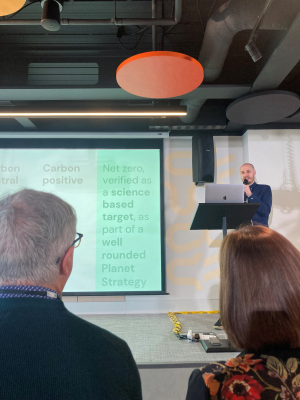This November we were invited by EVCOM member Shelton Fleming Associates (SFA) to join us at ‘FutureHack: Happening or Hype’, an annual event that SFA run to look towards the future. Claire Fennelow (EVCOM’s Exec Director) and I arrived at the venue to find a room filled with tech innovations we could interact with and ask questions of.
Andrew Reid (Director, Strategy, Marketing and Digital Services at SFA) opened the conference part of the day. Today, he said, we would be hearing about tech that is happening right now, and tech that people are excited about being developed in the future – the hype, as it were. Although he added that we have to look at things very holistically when trying to assess whether the ‘hype’ is justified. He talked about the history of the events industry, the shifts it has made and the acceleration we have seen in more recent history. Now, he said, the focus was on events that brought people together, convening across industries. In 2025 he predicted the metaverse would come in its own in the events industry.
This led seamlessly into futurist Amelia Kallman’s headline talk. “We are at a pivotal place in our relationship with technology,” she said. This has trickled down for the tech experts to everyday users who want something better, an attitude which is “fertile ground for a renaissance,” she said. She explained the difference between web2 and web3. For gamers, she said, the metaverse would feel like an easy transition. But she predicted that Creative AI could be the bridge between the metaverse and those who don’t engage with the gaming world at all. The metaverse, she said, would become more widespread once it engaged with our physical world. She also predicted that soon we would have headsets as a standard third device (alongside phone and laptop), once they had become smaller and more fashionable. However, she said, data contributes double what the aviation industry does to greenhouse gases and the metaverse would only increase that so it’s crucial that when developing this tech, companies and individuals think about how they can make it sustainable. “We are the ones deciding how this future is going to unfold,” she finished.
We then heard from Neil Evely and Igal Nassima, both from SuperBright. Neil talked about creating both real and new environment in a digital space. He talked about the process of working with researchers and architects to create a virtual networking space, for example, designed to encourage interaction. He also spoke about the possibility of creating multi-platform spaces which hold a mix of the fictional and the real-world. Igal went on to pose the question: ‘Can 3D objects be their own shops online?’ He described a future in which ecommerce was platform agnostic, and digital worlds did not need to be accessed via a screen. Instead, the whole world would become your screen. Ingrid Orstadius (BlippAR) spoke next, highlighting the importance of accessible technology, as a great way of capturing people’s attention. Spending time interacting with things invests people in them, she said, citing IKEA furniture as an example!
Andrew then returned to the stage to interview Adam Parry (Events Industry News) who spoke in depth about community, differentiating your business community and your personal community. “Most people think they want a community when what they actually want is an audience,” he said, encouraging people to think hard about who your community is vs. your audience. Adam then took over interviewing, bringing Matt Falla (Parallel) to the stage to discuss how visualisation can be a great way to get the most out of your data, to understand its value and to find out what story the data is telling you.

Neil Clark (TBX Impact) ended the series of talks with an urgent call for tech developers to “make the planet a stakeholder.” He talked about the severity of the climate emergency we are facing, the steps being taken forwards and the steps being taken back. For example, Coca Cola, the world’s largest plastic polluter, sponsored COP27. Neil advocated for Net Zero as a better approach than carbon negative/ neutral/ positive which puts the emphasis on offsetting rather than reduction or removal. He shared examples of some great companies, including Ecosia, Iron Mountain, Krystal, kLyk, fairphone and framework, who are offering sustainable tech and all have well rounded planet strategies. “Planet-centred design,” said Neil, is what we need.
We then broke into groups to finish the day with ideation sessions. One group focused on the future of tech and the other focused on the future of the planet. I was in the latter, led by Neil. We concluded that we were long way off what needed to be done to save our planet and discussed the many barriers in place to individuals, companies and governments prioritising this vital issue. Tech, we agreed, could play a big part in a more sustainable future, but only if its creators put the planet front and centre.
Thank you so much to Shelton Fleming Associates for having us. It was a fascinating day, that left us thinking in a serious way about the future of tech and of our planet.



